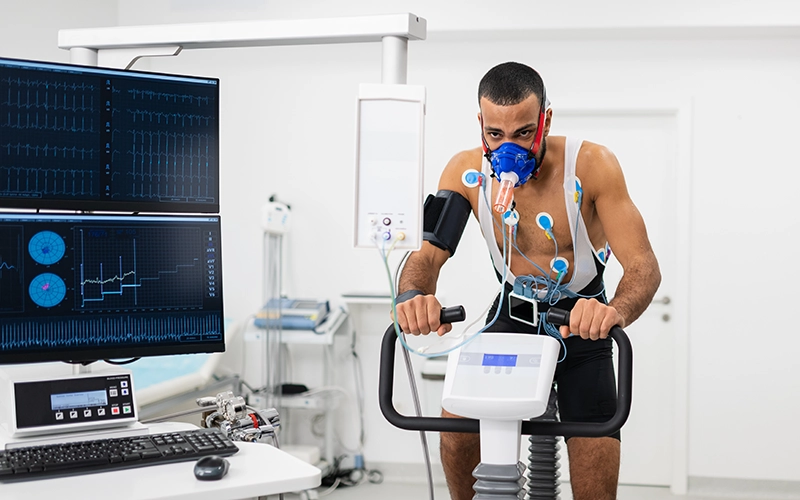What is Exercise Science?
Reviewed by Colin Pennington, PhD
Gwynedd Mercy University’s Exercise Science Program Coordinator
Whether you're analyzing muscle growth, preventing injuries, or helping athletes perform at their peak, the field of Exercise Science is all about empowering people through movement.
The skills learned with a bachelor’s degree in Exercise Science can make you highly valuable to employers in a variety of careers in health, fitness, wellness, and rehabilitation. Optimally, these skills are developed through coursework, practical experience, and hands-on learning opportunities.
For a closer look, explore below the skills below that Exercise Science majors develop at Gwynedd Mercy University.
1. Knowledge of Human Anatomy and Physiology
Understanding of the body’s structure and function
Develop a deep understanding of how the body's systems (muscular, skeletal, cardiovascular, etc.) work together during physical activity and how exercise impacts these systems.
Application to exercise programming
Learn to assess the physiological effects of exercise and adapt programs based on individual needs.
2.Exercise Assessment and Testing Skills
Fitness testing
Hone your ability to conduct physical assessments, such as cardiovascular fitness tests, strength assessments, flexibility testing, and body composition evaluations.
Interpreting results
Exercise Science majors are skilled at analyzing test results and using that data to design personalized exercise programs for individuals or groups.
3. Program Design and Implementation
Exercise prescription
You’ll learn to develop and prescribe customized exercise regimens based on individual goals, such as weight loss, injury rehabilitation, or athletic performance enhancement.
Personalized fitness plans
Create programs for specific populations, including athletes, older adults, or those with chronic conditions.
4. Knowledge of Nutrition and Metabolism
Basic nutrition principles
Exercise Science students gain an understanding of how nutrition affects exercise performance and recovery. This includes knowledge of macronutrients, micronutrients, hydration, and supplements.
Fueling for performance
Learn to provide general nutritional guidance to enhance exercise outcomes, particularly for athletes or individuals looking to improve their physical health.
5. Injury Prevention and Rehabilitation Skills
Understanding of common injuries
Gain knowledge of musculoskeletal injuries and conditions, how they occur, and how to prevent them.
Rehabilitation techniques
Exercise Science majors are familiar with rehabilitation strategies, especially for those recovering from injuries or surgery. They can also recommend modifications to exercise programs to accommodate injuries.
6. Biomechanics and Kinesiology Skills
Movement analysis
An understanding of human movement mechanics allows Exercise Science majors to analyze and improve techniques to prevent injury and maximize efficiency in exercise.
Posture and gait analysis
As an Exercise Science student, you’ll learn to assess how posture and gait affect physical performance and health.
7. Psychology of Exercise
Motivation techniques
Exercise Science majors are skilled in understanding psychological factors that influence physical activity, such as motivation, goal setting, and overcoming barriers to exercise.
Behavior change strategies
Graduates are trained to work with individuals on developing healthy habits and staying motivated to maintain long-term exercise programs.
8. Communication Skills
Effective communication
Develop the ability to explain complex concepts in anatomy, exercise physiology, and health in simple, easy-to-understand terms to clients, patients, or athletes.
Client-centered coaching
Sharpen your skills in counseling and motivating clients to make informed choices regarding exercise, nutrition, and lifestyle changes.
Public speaking and education
Exercise Science majors are often called upon to deliver educational presentations, conduct workshops, or lead group classes.
9. Research and Data Analysis Skills
Conducting research
Many Exercise Science programs include research components, giving students the ability to conduct studies, interpret data, and apply scientific findings to exercise programs and health interventions.
Critical thinking
Exercise Science majors are trained to evaluate research critically and apply evidence-based practices to their work.
10. Leadership and Teamwork
Leadership skills
Whether leading fitness classes, managing wellness programs, or working in healthcare settings, Exercise Science majors develop leadership skills necessary to guide and motivate groups.
Collaboration
Learn to work well in teams, fostering strong collaborative skills that are valuable in multi-disciplinary healthcare or fitness settings.
11. Ethical and Professional Responsibility
Professional ethics
Exercise Science majors are taught the importance of maintaining ethical practices when working with clients or patients, including confidentiality, integrity, and respect for others.
Cultural competence
Graduates have learned to respect and work effectively with people from diverse backgrounds, recognizing the importance of inclusivity in health and fitness settings.
12. Technology and Equipment Proficiency
Use of fitness technology
Graduates are familiar with various fitness tools, such as heart rate monitors, metabolic carts, resistance training equipment, and wearable fitness devices.
Software applications
They may also be proficient in using software for designing exercise programs, tracking client progress, or analyzing fitness data.
13. Time Management and Organizational Skills
Managing multiple clients or patients
Exercise Science majors develop strong time management skills, allowing them to juggle various clients, projects, or responsibilities, particularly in settings like personal training or rehabilitation clinics.
Event and program management
For those interested in fitness programming or wellness coordination, organizational skills are essential for planning, executing, and evaluating programs.
14. Adaptability and Problem-Solving
Adapting to various environments
Whether working in a gym, rehabilitation clinic, or sports team, Exercise Science majors are trained to adapt their knowledge and skills to different work environments.
Creative problem-solving
Graduates are able to quickly identify challenges or limitations and develop solutions to ensure the success of exercise programs.
Exercise Science at GMercyU: A Future that Moves with You
Interested in improving people’s health and performance? At GMercyU, you’ll learn all of the skills above in a new state-of-the-market building with an Exercise Science Lab equipped with the latest technology. There, you’ll get hands-on experience assessing and optimizing human performance.
A multidisciplinary program, the Bachelor of Health Science in Exercise Science at GMercyU prepares students for a range of exciting careers across various industries. The program also supports the University’s mission of fostering compassionate, service-oriented professionals.
The future of health is in your hands. Start your journey today at GMercyU — where passion meets purpose!